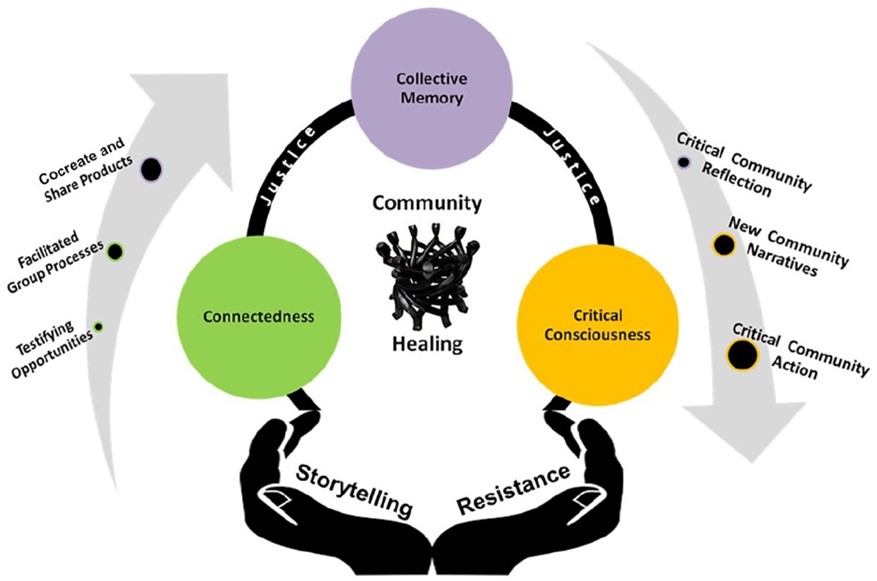Hello, AEA365 friends! I am LaShaune P. Johnson, PhD. I am a medical sociologist, the founder of Estella Lucia Evaluation, LLC, and a faculty at the University of Houston. I am an alumna of the LEEAD program and the Certified Listener Poet training. I am a community-based participatory researcher who uses arts-based methods to share the stories gifted to me by my community partners. In my research, advocacy, and evaluation work, I try to make space to use my CREE training to engage with and center the communities most impacted by the complex health disparities.
Most of the disparities that I explore are found at the intersections of political, economic, social, historical, environmental and psychological violence. As you may know, our current political environment can make it difficult to address these root causes head on. Even as our voices as health equity champions are muffled, the embodied experience of disparities continues, and our community partners have not stopped working on these issues.
In recent years, “listening sessions” or “community conversations” have been used as a tool to for public/population health data collection. While the intent of these conversations is often good, unfortunately, some still feel extractive, and de-emphasize the humanity of these traumatized populations. In response, I try to find ways these conversations can serve an “off-label” purpose—facilitating healing and, potentially, a little “good trouble”.
Chioneso and colleagues offered their Community Health and Resistance Through Storytelling (C-HeARTS) framework in recent years. This multidisciplinary approach is not just about collecting data, but about offering a space for healing as participants speak about trauma. This image highlights the C-HeARTS practice.

Tip: CREE practitioners can modify their statements of work to allow for the co-creation of narratives. If you are already working with community partners for data parties or debriefing sessions, could you modify your post-evaluation processes to allow for a session focused on narrative creation and/or community action plans?
Similarly, McCoy and colleagues’ work about creating counterspaces through focus groups. They state: “Focus groups serve as counterspaces by allowing Black girls and Black women to appreciate their intersectional identities, providing a space for psychological safety and healing as they share similar stories and experiences while uplifting one another, foster connections, and engage in collective advocacy.”
Hot Tip: While planning the listening sessions, you could you work to create additional opportunities (after the official session) to allow your partners to grieve, celebrate, heal, and support. These counterspaces should be facilitated by trusted community partners, and not attended by you or members of the group that called for the listening session.
While I know that these are difficult times to be an equity-focused health researcher, I do believe that counterspaces offer an opportunity to influence public health. The powerful narratives gained during the session, and the momentum created afterwards, can allow us to sustain some momentum towards health justice, as we weather political storms.
Rad Resources
- I have found that the conversations about research “accompaniment” have allowed me to think about how I can find small ways to “walk alongside” my community partners. I was an editor of a book that offer some examples of this in research and community engagement and my colleagues have recently published a book about accompaniment with im/migrant populations
- ASPPH’s work around DEI in public health offers some useful tools
- The Elevate Theatre Company, LLC has found innovative ways to use playwriting to spotlight the stories of the community to further justice.
- Take a look my colleague, David Fakunle’s approach to public health storytelling, through his work at Discoverme: Recoverme
Do you have questions, concerns, kudos, or content to extend this aea365 contribution? Please add them in the comments section for this post on the aea365 webpage so that we may enrich our community of practice. Would you like to submit an aea365 Tip? Please send a note of interest to aea365@eval.org . aea365 is sponsored by the American Evaluation Association and provides a Tip-a-Day by and for evaluators. The views and opinions expressed on the AEA365 blog are solely those of the original authors and other contributors. These views and opinions do not necessarily represent those of the American Evaluation Association, and/or any/all contributors to this site.
